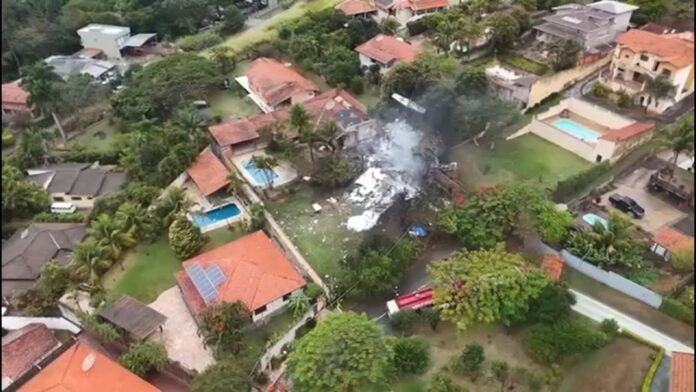A Voepass ATR 72-500 crashed into residential area outside São Paulo, killing all 61 passengers and crew. Investigation underway to determine cause
On August 9, 2024, a catastrophic plane crash occurred outside São Paulo, Brazil, claiming the lives of all 61 people aboard. The Voepass ATR 72-500, a twin-engine turboprop, was en route from Cascavel to São Paulo’s Guarulhos Airport when it tragically plummeted into a residential neighbourhood in Vinhedo.
The flight, identified as Voepass Flight 2283, had just departed from Cascavel in the Paraná state and was scheduled to land in São Paulo. However, shortly before 1:30 p.m. local time, the plane lost communication with air traffic control and began an alarming descent. Flight tracking data reveals the aircraft dropped from 17,000 feet to the ground in just one minute.
Dramatic footage circulating on social media shows the plane spiralling uncontrollably before crashing into several houses. The impact caused a massive fire, engulfing the wreckage and creating a scene of devastation. Fortunately, no casualties occurred on the ground, as the area was evacuated in response to the crash.
Voepass, the airline operating the flight, confirmed that all 57 passengers and four crew members were killed. The aircraft had been cruising steadily until it began to lose altitude abruptly, descending at a rate of approximately 17,000 feet per minute. The final data transmission from the plane came just before it began its rapid descent, leaving investigators with scant information on the events leading up to the crash.
The plane’s two black boxes, which record flight data and cockpit conversations, are now in the hands of investigators. Voepass CEO Eduardo Busch stated that the airline is cooperating fully with the Brazilian Air Force and aviation authorities to determine the cause of the accident. The ATR 72-500, manufactured in 2010 and purchased by Voepass in 2022, had previously been denied certification for air taxi use, though details of this restriction are still unclear.
In the immediate aftermath of the crash, Brazilian President Luiz Inácio Lula da Silva called for a minute of silence and declared three days of mourning. The government has mobilized resources to support the victims’ families, including accommodations and psychological assistance. São Paulo authorities are assisting in identifying the victims, many of whom were severely burned.
Residents of Vinhedo expressed shock and grief, with some narrowly avoiding the disaster as they missed the flight due to boarding gate errors. The tragedy has left the local community reeling as they come to terms with the impact of the disaster.
Analysis:
Political: The crash has placed additional pressure on Brazilian authorities and aviation regulators to enhance safety protocols and oversight. With President Lula declaring three days of mourning, the government faces scrutiny over its response to the incident and its handling of aviation safety. The crash may prompt calls for political action to improve infrastructure and aviation standards, potentially influencing upcoming legislative discussions on transport and safety regulations.
Social: The disaster highlights the vulnerability of everyday life to unforeseen tragedies, sparking widespread public concern and empathy. Social media platforms have been flooded with reactions from those affected and from people expressing condolences. The crash also underscores the emotional and psychological impact of such events on communities, with many residents sharing their personal stories of narrowly escaping the disaster and the emotional toll it has taken on them.
Racial: While the crash itself does not have a direct racial component, the response and aftermath may reflect broader societal attitudes towards different demographic groups in Brazil. The handling of the disaster and support provided to victims’ families could be scrutinized for equity, particularly in a diverse country with significant socioeconomic disparities. Ensuring that all affected families receive adequate support and fair treatment may become a point of discussion.
Gender: Gender dynamics might not be immediately apparent in the context of the crash, but the implications for families and the roles of women in grieving and recovery could emerge. Women, often primary caregivers, may face unique challenges in dealing with the aftermath of such tragedies. The societal response and support systems in place will be crucial in addressing these challenges.
Economic: The crash’s economic implications are multifaceted. Voepass faces significant financial repercussions, including compensation claims, potential legal liabilities, and the cost of investigating the accident. The broader aviation industry might also experience heightened scrutiny and regulatory changes, impacting operational costs and practices. Additionally, the local economy in Vinhedo could suffer due to the destruction caused and the disruption of daily life. The financial strain on affected families and the cost of recovery efforts will further compound the economic impact of the tragedy.
